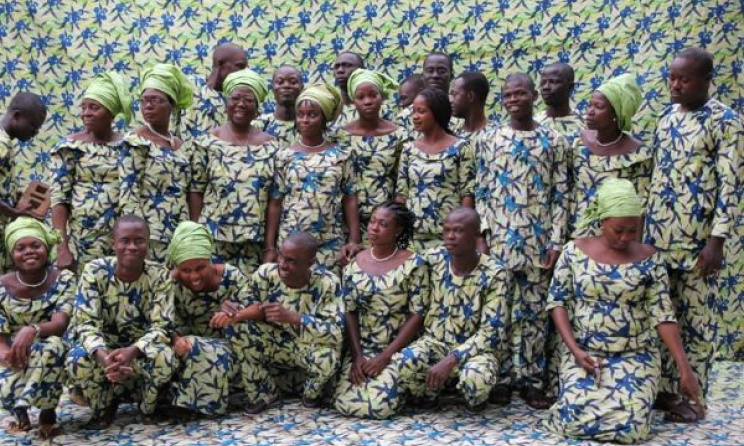Gospel music in Benin
The musical scene of Benin has experienced a period of upheaval and has shifted the lines over the last few years. This is the case for Gospel music which is the opposite of the so-called secular music.
 Choir of Angels (Photo) : Myette Fauchère. www.myettefauchere.wordpress.com
Choir of Angels (Photo) : Myette Fauchère. www.myettefauchere.wordpress.com
Gospel music attracts crowds and inspires religious circles but not enough from a qualitative perspective. For example, the most beautiful songs played in big churches, temples and even in funeral ceremonies are American, Nigerian, Ghanaian or Ivorian.
In recent years, however, artistic groups have taken over, under the watchful and professional eye of John Migan, a true gospel singer.
Overview
Historically, it has been difficult for Beninese gospel musicians to stand out from the so-called secular music. Gospel artists did not have their own repertoire despite all the facilities available in churches.
The road was bumpy for many years but finally led to the recognition of this musical genre in Benin. This recognition only dates from 1999, with the first International Gospel Festival and Racines initiated by the former President of the Republic, Mathieu Kerekou.
The prominent multicultural event held in Cotonou during seven days, to celebrate the reconciliation between Haiti, Cuba and Benin was the trigger for many young talents and continues to inspire today.
From John Migan’s family to Arnauld Migan, Miriam Ayizansi, Anna Téko who challenged denominational barriers, Jonny Sourou, the most popular gospel singer in Benin, the consecrated Sandra Heriti, the voice of eternal joy of Sessimè very popular amongst the youth, the soft voice of Kinzah and the touching Dossi, it can be said that a new generation is here to stay and promote gospel music in Benin.
Findings
Despite this pool of talents, nationally and internationally, some do not tolerate the abusive interpretation of core texts and melodies for commercial purposes. Benin has an untapped reservoir of potential which music analysts, outstanding composers, internationally renowned arrangers and gospel singers are working on. In short, a true circle of music professionals who have increasingly more resources made available by the churches.
The results are significant and narrow the gap with other music genres, through promotion and communication, from year to year. The other advantage lies with the ease of gospel Christian artists in attracting the faithful, seeing more and more followers in churches.
In a country like Benin, strongly marked by evangelism, some gospel singers like Anna Teko, fall within a "civil religion” with Christian connotation and seek to promote concepts of forgiveness, integrity and humility while being available to perform concerts.
Religious inspiration
Beninese artists are becoming more attached to the rhythms and folklore of the region, while remaining in a scenic modernism. Gospel artists, who show a fierce desire to be professionally recognized, and experiment with new repertoires, are becoming popular. One such example is the Awangbahou rhythm of the Célestes.
Music festivals are blooming in Benin, hosting artists from the sub region. Political stability facilitates international opportunities and gatherings for the churches, and indigenous religions, thereby promoting gospel-inspired mix with musicians from elsewhere. This is an opportunity for Beninese artists to improve.
The Festival Canaan Gospel organized by the Pasteur Ithiel Dossou whose mission is to revolutionize gospel music in five years, is such an example. The pastor has invested substantial resources to bring back Beninese stars like Maggie Blanchard Canada, Thierry of France, Jean-Jacques, Rodstar Marcel Boungou and many others. These distinguished singers come to perform alongside local talents like Ange Ahouangonou alias Kinivi, Désiré Kindomihou, or Apollinaire Gandonou to celebrate the gospel and local voices.
Economic and cultural impact
Although the sociological realities show that Benin's churches date back several years, gospel music did not have much impact on economic development. There were however important contributions in the field of education and social welfare. Yet, gospel artists pulled in profits with the flow of phonographic works sold to church and temple followers, scattered throughout the territory.
Evolution of Gospel Music
Over the last few years, churches have provided the largest logistic material, essential in generating wealth. This explains why gospel platformsare becoming the largest training avenues for arts and entertainment in Benin.
Church leaders make maximum use of the advantages granted to religious denominations by governments regarding tax exemptions for importing sound equipment and equipment of all kinds for the benefit of artists and the consumer.
If the ambition of the great majority of gospel singers is to spread the gospel to the nation through their songs, so “that whoever believes in him shall not perish but have eternal life.” Beninese gospel still has a long way to go but there is room for hope.________________________________________
Source :
http://regardsprotestants.com
http://www.voluncorp.com
http://www.lapressedujour.net
http://lautrefraternite.com
http://www.yasni.info
http://www.culturedafrique.com



















Commentaires
s'identifier or register to post comments